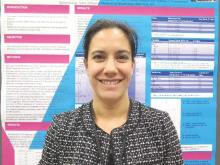SAN FRANCISCO – A variety of commonly used medications may improve survival of pancreatic cancer, reducing the risk of death by up to one-fourth, according to a pair of national retrospective cohort studies reported in a poster session at the Gastrointestinal Cancers Symposium.
In the first study, Dr. Muhammad S. Beg and his colleagues analyzed data from Surveillance, Epidemiology and End Results (SEER)-Medicare Part D beneficiaries with pancreatic cancer for the years 2006-2009. Patients were defined as using a medication if they filled at least two prescriptions within a year of the diagnosis.
“There is mounting preclinical evidence that medications conventionally used for noncancer indications may have an effect on pancreatic cancer biology and can potentially impart an effect on cancer outcome,” Dr. Beg said in an interview.
However, “validating each of these findings in the clinic in the form of prospective clinical trials is not feasible due to constraints related to resources and time. Historically, institutional cancer registries lack details on patient comorbidity and medication usage. As a result, prior studies are limited to small database analysis and results have been mixed,” he added. “Availability of large clinical datasets allows the impact of these medications to be evaluated on large numbers of cancer patients.”
Multivariate analyses based on 13,702 patients with pancreatic adenocarcinoma showed that the adjusted risk of death was significantly lower for users of beta-blockers (hazard ratio, 0.92), warfarin (HR, 0.90), insulin (HR, 0.89), and heparin (HR, 0.76).
The findings are most noteworthy for warfarin, which appears to act through inhibition of the gas6-axl pathway, according to Dr. Beg of UT Southwestern Medical Center, Simmons Cancer Center, Dallas.
“Warfarin is an old drug, cheap and no one really likes it as it is tough for patients to take,” he elaborated. But “we have a potential mechanism of action and a new class of drugs, AXL inhibitors, which given this information should be explored in pancreatic cancer.”
In contrast, risk of death was not affected by use of statins, thiazolidinediones, or metformin. “That metformin did not have an effect goes against a large number of studies [that] suggested metformin could be very active in pancreatic cancer,” Dr. Beg said.
“In a cancer [that] has such dismal outcome as pancreatic cancer, understanding how to best use concurrent medications may have significant impact on patients’ outcomes and our understanding of the cancer biology,” he concluded.
In the second study, Dr. Aimee Lucas and her colleagues analyzed data from SEER-Medicare Part D beneficiaries with pancreatic cancer for the years 2007-2011. They excluded those receiving a diabetes diagnosis in the year before their cancer diagnosis to minimize the effect of reverse causation, whereby the cancer led to diabetes.
Analyses were based on 1,916 patients with pancreatic adenocarcinoma who were taking medications for diabetes before their cancer diagnosis. Overall, 57% used metformin, with or without other medications.
In propensity-adjusted analyses, mean survival was longer for metformin users than for nonusers (5.5 vs. 4.2 months; P less than .01), reported Dr. Lucas of the Icahn School of Medicine at Mount Sinai, New York. The difference was significant across stages, except for stage I.
In multivariate analysis, metformin users still had a reduced risk of death (hazard ratio, 0.88; P less than .01). The association was consistent across subgroups of patients stratified by Charlson comorbidity score, diabetic complications severity index score, presence of chronic kidney disease, and use of insulin or other hypoglycemic agents.
On the other hand, insulin users had poorer survival than nonusers (4.3 vs. 5.5 months; P less than .01). And survival did not differ significantly according to use of sulfonylureas, thiazolidinediones, meglitinides, dipeptidyl peptidase 4 (DPP-4) inhibitors, or alpha-glucosidase inhibitors.
“We think that this study provides growing evidence for a survival benefit for diabetics who are on metformin at the time of diagnosis, and we would be interested in further work to try to figure out why,” Dr. Lucas said in an interview at the symposium, which was sponsored by the ASCO, ASTRO, the American Gastroenterological Association, and the Society of Urologic Oncology.
More research will be needed in particular to determine whether the findings for metformin represent a true protective effect of the drug or, rather, a harmful effect of other medications such as insulin, she added.
Dr. Lucas likewise noted the power of being able to tap into a large database that captures medication use and comorbidities when studying these associations in pancreatic cancer.
Smaller and single-institution cohorts studies have been done, she commented. But “no one has really been able to control for severity of diabetes and comorbidities in the same way that we were able to. And that’s just because we have the SEER-Medicare database and such a large sample size.”


